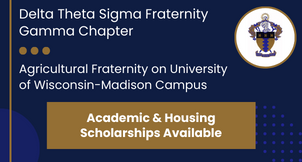November 2017
A Message From Your Executive Director…
By Stacy Eslick, WSCA Executive Director
School Counselors as Leaders
November must be the month that WSCA starts thinking about school counselor leadership. The past few years, this topic has naturally been the focus of this monthly article. Wisconsin has outstanding school counselor leaders not only within WSCA, but serving the profession in schools, communities, and organizations throughout the state. Culturally, we are also a humble group and tend to not acknowledge the leadership we bring to the table.
As an association, WSCA is seeking to grow leaders not only internally, but to fill the needs and demands in our schools.
Colette Dollarhide wrote an article, The Messy Process of School Counselor Leadership, in the July 2013 edition of ASCA School Counselor that speaks to the challenges of school counselor leadership. Dollarhide offers sage guidance in the article:
Although there is no recipe for leadership, there are things we can learn from successful leaders. Successful leadership depends on four things:
- Assessment of your own strengths and challenges
- Assessment of your experience in terms of your leadership goals
- Knowledge about followers
- Knowledge about leadership”
As the statewide group representing school counselors, we are telling stakeholders that school counselors should be viewed as leaders. With that message there also needs to be support and professional development for school counselors to be confident of this role.
Please consider strengthening your leadership through the upcoming opportunities offered by WSCA:
- Attend Colette Dollarhide’s, national expert on school counselor leadership, full day preconference on School Counselors as Leaders and Agents of Change for Social Justice. The morning is dedicated to just school counselors, and in the afternoon, school administrators will be joining counselors to work in collaboration on counselor leadership development.
- Attend a WSCA-sponsored ASCA model training scheduled across the state. The four tenants of the ASCA model are leadership, advocacy, collaboration and system change.
- Join a WSCA committee or apply to a be on the WSCA leadership team as a Coordinator. These groups are a terrific way to connect with other leaders and gain new experiences and skills.
- If you enjoy talking about visioning and thinking about the future, consider applying for the WSCA Board of Directors.
- Plan on attending the WSCA conference in February. It is an amazing opportunity to get recharged and energized about being a school counselor!
- Sign up to attend Afternoon on the Hill in February. You will have an opportunity to learn more about legislative issues impacting the school counseling profession and actively be involved in advocacy efforts to educate legislators and leaders about the role of school counselors.
The WSCA leadership team is eager to support school counselors in the work of leadership development! Please join us in this messy process of school counselor leadership. We are much stronger as a collective whole and supporting each in this very difficult work.
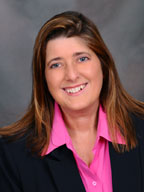
Warm regards,
Stacy
References:
Dollarhide, C., Ph.D. (2013, July). The Messy Process of School Counselor Leadership. ASCA School Counselor , July • August (2013), 11-18. doi:https://www.schoolcounselor.org/asca/media/asca/LeadershipSpecialist/MessyProcess.pdf
WSCA Board Chair Message: WSCA Full-time Executive Director Announcement
By Olin Morrison, WSCA Board Chair
How does WSCA work? Policy Governance 101: Ends Policies
Policy governance is a system for organizational management that provides clear definitions for role accountability and interaction. Within the WSCA policy manual, you will find 4 main sections: Ends Policies, Executive Limitations, Governing Process, and Board-Management Delegation. The policies contained in these sections help to define the “why” of the organization, who is accountable for what, and how the Board of Directors, Executive Director, and Owners interact. In this article I am going to dive into our Ends Policies.
The Ends Policies are, without a doubt, the fun policies (yes, I said fun and policies in the same sentence). Since the policies in the other three main sections are mostly “boilerplate,” the Ends Policies are where an organization’s story is truly written. By reviewing an organization’s Ends Policies, one can gain a clear picture of not only what an organization does, but also why.
Conditions exist so the Wisconsin School Counselors will practice with the highest level of effectiveness.
WSCA’s current Ends Policies are:
- School counselors (active and pre‐service) will be knowledgeable about effective school counseling practices.
- School counselors are knowledgeable about the development, implementation, and evaluation of comprehensive school counseling programs.
- School counselors are knowledgeable about current ethical and professional practices and their application.
- School counselors are knowledgeable about current trends in school counseling and education.
- School counselors are actively engaged in state and national initiatives that impact the school counseling profession.
- School counselors are knowledgeable about leadership and advocacy principles.
- School counselors are knowledgeable about culturally responsive practices.
- Key Stakeholders (including but not limited to) school administrators, policymakers, and community members will understand the impact made by the school counselor implementing a comprehensive school counseling program.
Ends Policies are set by the Board of Directors and delegated to the Executive Director to carry out any reasonable interpretation. Progress toward these policies is regularly monitored via reports from the Executive Director to the Board. These “Monitoring Reports” are one of the main ways the Board evaluates the performance of the Executive Director and the organization as a whole.
All of WSCA’s policies are written as “nesting” policies. In the case of WSCA’s Ends Policies, “Conditions exist so the Wisconsin School Counselors will practice with the highest level of effectiveness,” is the main policy and all policies below create further definition of this overarching End Policy. So, if you are ever asked: What does WSCA do? Or, why does WSCA even exist? The big answer is: WSCA ensures Conditions exist so the Wisconsin School Counselors will practice with the highest level of effectiveness.
This Month’s Feature: Interacting with Students Impacted by Trauma
By Angela Goebel, WSCA Assistant Board Chair
All behavior is communication. The words and actions children use each and every day is communicating something to us. A theme Ross Greene voices is “Kids do well if they can.” And when children are not doing well, it is our job to reflect and consider what their behavior is saying. Many schools are becoming more and more educated regarding Trauma Informed Practices to help understand the purpose behind the behaviors children are displaying. And with these new discoveries, staff within schools are better supporting our children through Trauma Informed Practices.
Trauma is defined as the exposure to an event that threatens or harms the physical or emotional integrity of the individual or someone close to the individual. It can overwhelm the person’s ability to respond and create significant difficulty in functioning.
Examples of trauma could include the following:
- A serious accident (e.g., car accident)
- Physical, sexual, or emotional abuse (or witnessed domestic violence)
- Loss of a loved one
- Family member who struggles with substance abuse
- Family member who experiences mental illness challenges
The prevalence of trauma in homes is greater than most may be aware. Studies estimate that 3-10 million children in the United States experience or witness trauma in their homes. This trauma may impact a child psychologically, emotionally and neurobiologically through their development. Learning, forming relationships, and functioning appropriately in the classroom can become a challenge for those affected by trauma. Trauma, however, does not have to limit a child. Many children can grow up gaining the skills to overcome obstacles they face and to be healthy and happy.
So what can you do in the here and now when supporting students impacted by trauma?
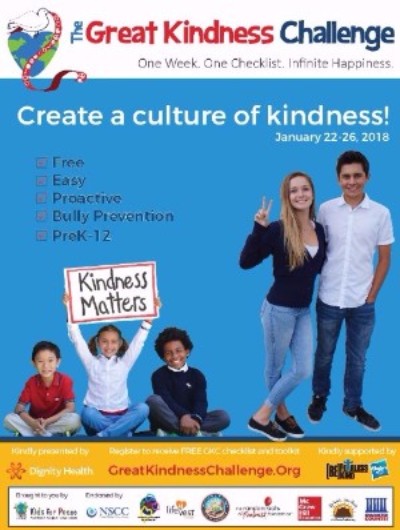 Special Feature: Great Kindness Challenge
Special Feature: Great Kindness Challenge
SAVE THE DATE: January 22-26, 2018!
The Great Kindness Challenge
http://www.greatkindnesschallenge.org/
A global initiative, The Great Kindness Challenge is a proactive and positive bullying prevention program that improves school climate and increases student engagement. The challenge is one week devoted to performing as many acts of kindness as possible on campus and in the community. Using the provided checklist of 50 kind acts, students and families accept the challenge and show the world that kindness matters.
Created in 2012, The Great Kindness Challenge officially launched in Carlsbad, CA with 3 schools and 1,614 students. The annual program has since increased enrollment each year, tripling its impact to 10,493,866 students in 15,057 schools, reaching across all 50 states and 91 countries this past January.
Building upon that momentum, the upcoming Great Kindness Challenge, scheduled for January 22-26, 2018, is preparing to double its outreach, mobilizing over 20 million students in 25,000 schools in over 100 countries. With this magnitude and reach, Kids for Peace has welcomed a new component to The Great Kindness Challenge: the Family Edition, which is taking this powerful kindness initiative beyond the classroom walls and extending to families and entire communities. With the Family Edition checklist in hand, families and community members are encouraged to cultivate a world of kindness, compassion and love.
Why participate?
Studies show that kindness matters and it’s scientifically proven! Not only does kindness improve our climate and communities but this simple concept and virtue can enhance our minds and bodies, too. According to Random Acts of Kindness and a study conducted by Dartmouth College, kindness improves peer relations, lowers anxiety and enhances concentration. Still not convinced? Check out a recent blog post, composed by Sarah Ebersole from McGraw-Hill Education about the benefits of kindness and The Great Kindness Challenge on campus and in our communities: https://medium.com/inspired-ideas-prek-12/4-reasons-to-take-the-great-kindness-challenge-b9476e6bb12c.
Beyond the one-week challenge, students and families can participate in a unifying campaign, supporting a community in need: Kind Coins for Hurricane Relief. This year in response to the historic hurricane season on US Territory, Kids for Peace, home to The Great Kindness Challenge is raising funds to build as many playgrounds at hurricane affected schools in Florida, Louisiana, Texas and Puerto Rico. Check out Jet Stream Jax, an eight-year-old meteorologist sharing about the devastation in his hometown, Houston and why play heals:
The Great Kindness Challenge has the power to increase empathy, tolerance and compassion for all families and students from kindergarten through high school. Schools and families may get involved by registering at no cost by visiting The Great Kindness Challenge website: http://greatkindnesschallenge.org. Here’s to creating a culture of kindness!
Scholarship Update
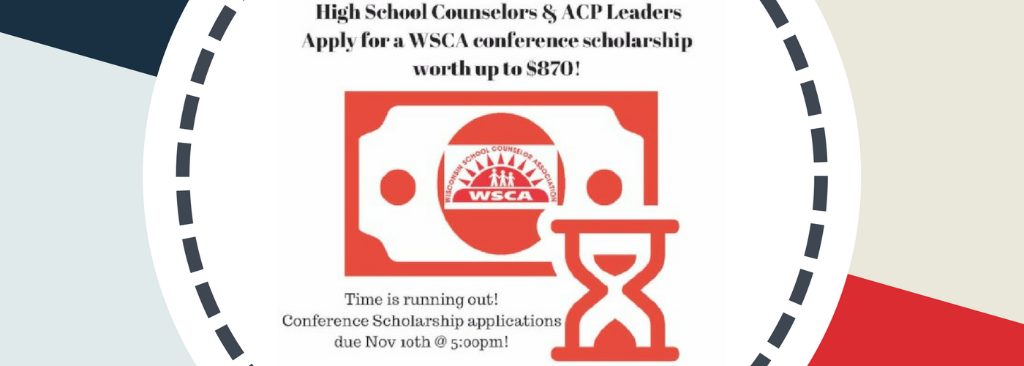
We applaud you, and to support the important work you do we’re pleased to sponsor scholarships for 50 counselors new to the profession and ACP Coordinators/leaders to attend the 2018 WSCA Conference. Many thanks to Great Lakes Higher Education Corporation & Affiliates for the generous grant to WSCA to make this scholarship possible.
Scholarship eligibility requirements:
- Wisconsin high school counselors with less than 5 years of experience.
OR
- ACP Coordinators/Leaders Each scholarship is worth up to $870 and covers:
- $280 WSCA Member Registration fees for Preconference & Conference
- $415 Room at conference hotel (Hilton Monona Terrace) & Parking
- $75 Meals stipend ($25/day)
- $100 Travel stipend (up to selection committee discretion)
Please direct questions to:
Stacy Eslick, WSCA Executive Director
stacye@wscaweb.org
Deadline:
Applications must be submitted on or before Tuesday, November 10, 2017, at 5:00 p.m. Late applications will not be accepted. WSCA will notify the winners and non-winners no later than Friday, December 1st.
PLEASE NOTE: As a condition of receiving the grant, WSCA will ask scholarship recipients to:
- Write a WSCAlink Newsletter article reflecting on their experience at the 2018 WSCA Conference and the impact on College & Career Readiness in their school;
- Submit all necessary registration paperwork by deadlines indicated in award notification.
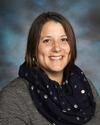
Staff Spotlight
Rebecca Schneider, Public Relations Chair
DeForest Area High School
Why did you decide to get involved with WSCA?
I thought it would be great to connect with school counselors throughout the state of Wisconsin. Our jobs can be very rewarding, yet exhausting. The WSCA Board is made up of a wide variety of people that are positive, fun and energetic about school counseling. It’s really rewarding.
What are you reading currently?
“You Learn By Living” by Eleanor Roosevelt. I’m really fascinated by Franklin D. Roosevelt and Eleanor Roosevelt. I had read a few books about them. There are also children’s books about FDR & Eleanor that I’m reading to my children now.
What do you love about your work?
Working with students and helping them overcome obstacles in their lives. I also enjoying sharing (emotional or academic) tools with them to figure out their concerns.
Where will we find you when you’re not at school?
Family is #1 to me. I love spending time with my husband and two spunky and loving children that are 4yrs-old & 6 yrs old. I love Halloween and I love hosting parties. As of now, we are getting ready to have our Halloween party… it’s a fun way to share our time together.
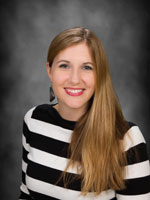 Director Spotlight
Director Spotlight
Adriana Plach, Board Director
Academic and Career Coordinator, Pewaukee School District
Why did you decide to get involved with WSCA?
When I was a graduate student, I attended my first WSCA Conference. It was such an incredible resource to have, and I have attended ever since.
As years passed, I wanted to give back to the organization that has given me so much and continues to provide me with support, tools, and confidence. Our members are extraordinary – it truly is an amazing way to network and focus on our growth and leadership as professionals.
What do you hope to accomplish through your role in WSCA?
Through my role as a director, I hope to support our organization to ensure it continues to be a valuable resource for our school counselors – for today and in the future. In addition, I hope to contribute to supporting counselors as they grow their leadership and advocacy for the profession.
What are you currently reading?
I have just started reading “The Gift of Fear” by Gavin De Becker. I am also reading The Dire King, by William Ritter, over my morning coffee.
What do you love about your work?
My “work” is so much more than just that – it is my home away from home. I love working with others and helping to build systems that make a positive impact on our students. I am truly excited about Academic & Career Planning and helping our youth learn about themselves and the world around them in ways that steer them on a personalized path to success and happiness. I work with amazing people – both in Pewaukee and on the WSCA Board – who are fun, student-centered, and future-focused. These people make every day that much better!
Why did you decide to become an educator?
I was in middle school when I decided I wanted to work in the field of mental health. After graduating with a degree in psychology I decided I also wanted to be in a school setting (having Academic & Career Planning back then would have helped me be much more efficient with my planning!). I have always loved the world of education and continuous learning, and it felt like home to me. The idea of being disconnected from that after graduation was disheartening. School counseling became a way for me to connect these elements and help others. Now I am committed to helping others find their passion.
What do you enjoy doing when you’re not at school?
When I am not at school, I am spending time with my family – my husband, my kids (ages 10 and 7), and my dogs. I love to read, cook, and travel. My vices in life include coffee, Pinterest, and YA novels.
Upcoming Events & Committee Updates
Government Relations Update
A big THANK YOU to everyone who contacted their elected officials in regards to the mental health in schools provision in the state budget. Sadly, the amendment adding school counselors and school psychologists to the language was not adopted by the joint finance committee before Governor Walker signed it. The government relations committee, along with our executive director Stacy Eslick continue to explore areas where this language can be changed to meet the mental health needs of all students in our state.
The importance of creating connections and relationships with our elected officials in Madison is at an all time high. 2018 is the year YOU can start that process by attending Afternoon on the Hill. The Government Relations team will coordinate everything for you. All you need to do is attend and meet with the elected officials representing you, your students and families in Madison. Save the date for Tuesday, February 20, 2018 1:30 – 4:30. Please feel free to contact the Government Relations Co-Coordinators for additional information or questions you have about Afternoon on the Hill.
Rachel Pufall & Andrea Donegan
govrelations@wscaweb.org
Publications Update
Publications Committee Update
Are you interested in helping with WSCAlink? Here are 2 ways to get involved:
- Submit an article! Anyone can write for our Tips for Best Practice section. Articles should be no more than 500 words and offer practical ideas that can be implemented right away. Past topics include a small-group that worked well, a great classroom management strategy, an enjoyable mindfulness technique, and more.
- Join the Editing Team! Do you have a penchant for pronouns? Do you leap for language? Do you delight in descriptions? If so, we would love for you to join the Publications Committee! Responsibilities include editing 2-3 WSCAlink issues per year. Contact us if you jump for jargon!
Send questions/articles to publications@wscaweb.org and then we will let you know when it will be used. Don’t be afraid, be published!
All submissions are due by the 10th of each month to publications@wscaweb.org
Upcoming topics include:
December: Social Media Standards for Success
January: Gearing Up for Conference: What’s in Store!
Conference Update
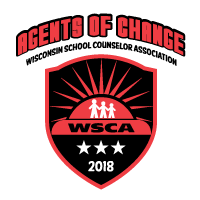 Wisconsin School Counselor Association Annual Conference
Wisconsin School Counselor Association Annual Conference
February 20-22, 2018
Madison, WI
Lots of events are being planned for the 2018 WSCA Conference. Check out the following updates:
Pre-Conference Workshops
The pre-conference workshops have been announced. Have you been interested in learning more about restorative justice and how it can improve student leadership and engagement? We’ve got a workshop for that! Are you wanting more resources related to trauma-informed practices? We’ve got a workshop for that! Wondering how to incorporate mindfulness activities in your work? We’ve got a workshop for that, plus much, much more. Check out the full list of workshops here.
Nominations for WSCA Professional Recognition Awards
It’s time to recognize those staff members and colleagues who have supported both school counselors and school counseling programs alike. There are eight different categories for professional recognition that are awarded, with categories ranging from school counseling teams to secretarial/support staff. Take a moment to recognize those Agents of Change that you have worked with. Award nominations are due by December 1, 2017.
Graduate Course
Did you know you can take 1-3 graduate credits through Viterbo while attending the WSCA Conference? Participating in a grad class can provide you with exciting resources, fun and practical lessons, networking opportunities, and personal growth. YOU choose what topics are most meaningful to your work. There are more than 80 topics to choose from! For more information and to view the list of possible topics click here.
Deadlines Approaching!
Sectional proposals can be submitted here. Deadline is November 10, 2017.
Scholarship opportunity to attend the WSCA Conference!
If you are a high school counselor with less than five years of experience OR an ACP Coordinator/Leader in your district and planning to attend the 2018 WSCA Conference, be sure to check out the Great Lakes Scholarship. The deadline for applications is November 10, 2017.
2018 WSCA Conference Links:
2018 Conference Home
Call for 2018 Sectional Proposals
Keynote Speakers
Scholarship Information
Graduate Course
Professional Recognition Award Nomination Form


